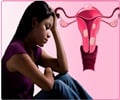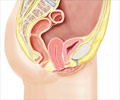Researchers have warned that if erratic menstrual cycles persist later into the teen years, girls should see a specialist to determine if they are suffering from Polycystic Ovarian Syndrome(PCOS).

PCOS is an endocrine disorder that is characterized by an excess of androgens or male hormones in the body. The imbalance of hormones interferes with the growth and release of eggs from the ovaries, which can prevent ovulation and menstruation.
Apart from irregular periods, symptoms associated with PCOS can include weight gain, hair growth on the body and face, thinning of the hair on the head, acne and infertility.
Women with PCOS are at risk for high blood pressure, high cholesterol and endometrial cancer. People with PCOS also tend to become resistant to insulin, which can lead to diabetes.
Suzanne Kavic, MD, division director, Reproductive Endocrinology, Loyola University Health System, said that symptoms associated with this syndrome can be concerning to young girls particularly during the teen years, which is already a stressful time.
However, Kavic said that PCOS can be identified at an early age and begin managing symptoms to alleviate some of the anxiety for these girls.
Advertisement
Source-ANI














